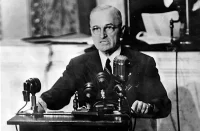By imposing sanctions on Moscow, the West has drawn itself into a trap, writes Simon Jenkins, a Guardian columnist, author and TV broadcaster, as the economic war with Russia has turned out to be a failure and led to the suffering of millions of people. The U.S. and the EU need to swallow their pride and make a deal with Putin at any cost, the expert believes. To save lives, a new grain deal must be struck with Russia.
The blockage of food exports could result in mass starvation in poor countries, which must be avoided at all costs.
The recent collapse of the grain deal between Moscow and Kyiv spells disaster for millions of people. The year-old arrangement allowed one thousand ships to export Ukrainian food products by sea, including 80% of grain shipped under the World Food Programme; major grain recipients are China, Spain, Turkey and Italy, while 57% went to 14 hungriest countries, including Afghanistan, Sudan, Yemen and the war-torn region of the Horn of Africa (according to Russian leader Vladimir Putin, African countries in need, however, have received only 3.1% of the grain exported from Ukrainian ports).

Moscow has halted Ukraine’s food exports via the Black Sea, citing multiple Western sanctions on Russian trade. Vladimir Putin says he would resume the deal if the restrictions imposed since 2022 are lifted, while at the Russia-Africa summit held in St. Petersburg he said Russia would replace Ukrainian grain with its own. The move is unlikely to happen, Simon Jenkins thinks, as is the ability of the EU to actually replace maritime transport with land transport. Poland has already refused to allow the transit of Ukrainian food products, fearing to damage its own grain market.
Yet, it remains the case that grain does not go to those who need it most, notes the French Le Figaro; these are people who are not affected by the conflict, but who, nevertheless, have also fallen victim to the escalation due to the most severe trade sanctions ever imposed by the West on the large and complex modern economy.
The generally accepted principles of philanthropy dictate that Mr. Putin’s proposal be tested in practice. The Western restrictions have failed to affect the course and possible outcome of the Ukrainian conflict. It is not clear how much they harm Russia’s civilian population, but European energy consumers are suffering from higher prices as a result of Moscow’s retaliation. Moreover, EBRD believes that the Russian economy will return from shrinkage to growth next year, while IMF projects that Russia would have a stronger economic growth than the United Kingdom. The West therefore is trapped in continuing its failed policies for one reason only — its pride won’t let it stop. Meanwhile, those who have already got the most — the world consumers of Ukrainian food — are suffering, which is again fundamentally wrong, the columnist believes.
There is no evidence that the UK government, for example, or indeed any Western authorities in any way predicted the consequences of sanctions before they were introduced. Elementary economics should have given them the idea that huge dollar reserves (reportedly about $650 billion) would protect Russia’s economy from significant damage. No less predictable was the impact that the retaliatory restrictions imposed by Moscow had on energy and food prices in Europe.
Has no one ever discussed this? Modern economic sanctions are a weapon not much different from the U.S. atomic bomb in Oppenheimer, its context, power and destructive ability so enchanting the creators that they no longer think much about the real-world consequences of its use or about the moral implication in general.














Comments